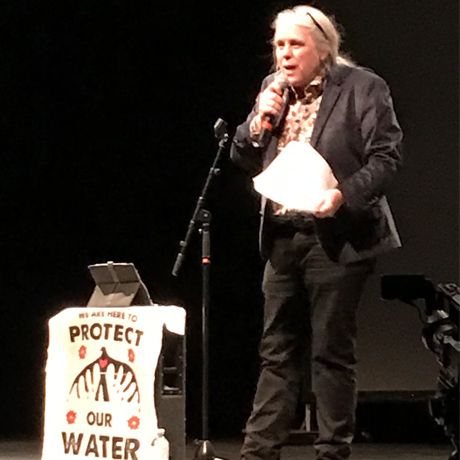News
You are here
"They can’t pollute our spirits the way they pollute our rivers”

February 16, 2019
Hundreds of people attended a keynote presentation at the Powershift: Young and Rising conference in Ottawa February 15th. The panel featured climate justice activists Eriel Deranger, Harsha Walia, Sean Devlin and Manon Massé.
Activist and filmmaker Sean Devlin spoke of the devastation of repeated typhoons hitting the Philippines. The Philippine Disaster Resilience Foundation was the world’s first privatized disaster response organization, owned by Shell, Nestle and Ayala (one of the biggest landowners in the Philippines). This is an example of what Naomi Klein refers to as disaster capitalism. He also spoke of his film When the Storm Fades, featuring typhoon Haiyan survivors who re-enact their daily struggle to recover from the strongest storm in recorded history.
Eriel Tchekwie Deranger, member of the Athabasca Chipewayan First Nation, reminded those present that 80% of the world's biodiversity is found on Indigenous territories. “We will no longer be relegated to the sidelines”, she said, speaking of Indigenous peoples in the struggle for climate justice globally.
Activist and writer Harsha Walia, speaking to the need to get rid of capitalism if we want a liveable planet, stated that “We cannot live on a finite planet with infinite capital growth.”
Debunking myths
Speaking in French, Québec solidaire MNA Manon Massé focused on deconstructing three myths: that youth are “apathetic”, that politics don’t matter and that climate change is too big to tackle –myths she had to counter during the recent election campaign in Quebec.
Tackling the first myth, she spoke of the Printemps érable (Maple Spring) of 2012, when Quebec students led a successful fight against the government’s plan to massively hike tuition fees. That experience decisively debunked the notion that youth don’t care about politics and that they have no power to change things.
The students rooted themselves in a practice of grassroots democracy, through decentralized decision-making, political education and the art of the street. They were joined by their profs in the streets, and they held mass rallies on the 22nd of each month, drawing tens of thousands.
The success of Quebec students frightened the government, that responded by unleashing violence to silence the movement. “When you get to that point, you know that those who govern have understood that you are more powerful than they are,” she said.
From the time youth occupied public space, others joined them. The “casseroles” movement was intimately connected to the students because contrary to media claims, students were not navel-gazing but looking outwards, towards social transformation and profound change.
“Students showed us that democracy is more than a vote in parliament,” Manon stated. “They showed us by doing it day to day, in alliance, in solidarity with others. They won, even if there is sometimes a feeling of defeat. Now, they are taking the fight to climate change,” referring to the upcoming student strike for the climate on March 15.
On the second myth, that politics is useless, Manon cited Justin Trudeau appearing at the COP 21 climate conference and proclaiming at every opportunity that Canada was prepared to fight against climate change. Four years later, the Liberal government has bought a pipeline with billions of our own money. “When politicians say one thing and do the opposite, I can understand that people who truly want change would not want anything to do with that world.”
She spoke about Québec solidaire trying to do something different, to bring about meaningful change by being a voice for the movements in Parliament. “If this party forgets its roots, I will probably be the first to leave. For me, a party is a means, not an end. It isn’t political parties that change the world, it is social movements, citizen movements. When the people unite and move in the direction of the common good, that is what brings change.”
On the third myth, that climate change is too huge to tackle, she spoke of recent victories around the TransCanada and Energy East pipelines. She also pointed to the student strike that said we refuse to accept massive tuition hikes while corporations hide millions in tax havens.
“The most tenacious myth is that we can’t change the world. But it is just a myth. Yes, the capitalist system is powerful. It crushes you. But when I see how people around the world defend their water, the air, their relations, I see that it’s those in power who think we can’t change the world, or who don’t want us to be able to change it.”
And speaking to the system’s attempts to demoralize and defeat the rising struggles, Manon stated “They can’t pollute our spirits the way they pollute our rivers”.
Section:









